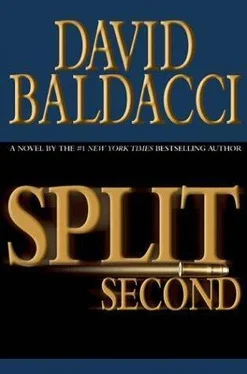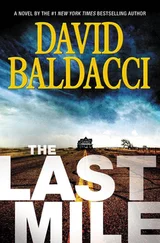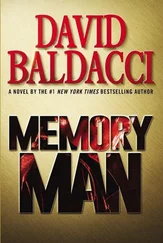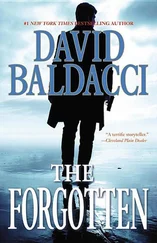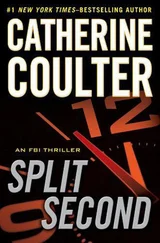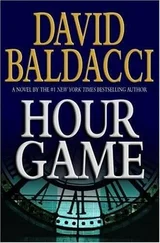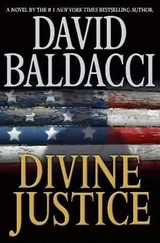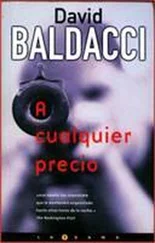"And you want my opinion on which of these categories Arnold fell into?"
"Being a friend and colleague, you've doubtlessly given the matter a great deal of thought," said King.
Jorst eyed him keenly through the wisps of smoke. "Well, I can't say the issue of what drove Arnold to become an assassin hasn't intrigued me over the years. However, I can't claim he fits neatly into any ideological or motivational box either."
"Well, maybe if we look at his background and the time period that led up to his action, we might be able to get somewhere," suggested Michelle.
Jorst checked his watch.
"I'm sorry," said Michelle. "Do you have a class?"
"No, actually I'm on sabbatical. Trying to finish a new book. So fire away."
Michelle took out a pen and notebook. "Why don't we start with a little background on Ramsey?" she prompted.
Jorst leaned back in his chair and stared at the ceiling. "Arnold did the hat trick at Berkeley, B.A., M.A., Ph.D. All at the top of his class, by the way. He also somehow found time to participate in protests against the Vietnam War, burn his draft card, march in civil rights demonstrations, attend sit-ins and lie-ins, get arrested, risk his life, all of that. He had by far the best academic credentials of any professor this department has ever employed and quickly achieved tenure here."
"Was he popular with his students?" asked King.
"For the most part, I think he was. More popular than I am with mine." Jorst chuckled. "I'm a far tougher grader than my late, lamented colleague."
"I assume his political leanings were far different than Ritter's?" asked Michelle.
"Ninety-nine percent of America would have fallen into that category, and thank God for that. He was a TV preacher who sucked money out of deluded people all over the country. How could a man like that run for the White House? It made me ashamed of my country."
"Sounds like Ramsey's opinions rubbed off on you," said King.
Jorst coughed and attempted a chuckle. "I certainly agreed with Arnold's assessment of Clyde Ritter as presidential material. However, I differed with him drastically on the proper response to the man's candidacy."
"So Ramsey was vocal about his feelings?"
"Very." Jorst stubbed out his cigarette and immediately lit another. "I remember him stalking around my office and pounding his fist into the palm of his hand and decrying the state of a citizenry that would allow a man like Clyde Ritter to gain purchase in national politics."
"But he had to know that Ritter had no chance of winning."
"That wasn't the issue. What wasn't nearly so obvious was the deal-making that was going on behind the scenes. Ritter had reached a critical mass in the polls, and that had started to make both the Republicans and the Democrats extremely nervous. He'd easily reached poll levels that enabled him to receive federal election funds and qualified him for national debate time. And whatever you could say about Ritter, he talked a good game. He was incredibly glib, and he connected with a certain element of the voting population. And you also have to understand that in addition to Ritter's own presidential campaign, he'd cobbled together an independent party coalition that had numerous candidates running for various offices in many of the larger states. That could have had disastrous consequences for the major party candidates."
"How so?" King asked.
"In many elections around the country his slate was splitting the traditional voting bases for the major-party candidates, in effect giving him control over the outcome of perhaps thirty percent of the seats in play. Now, when you have that much leverage in the political arena, well…"
"You get to pretty much name your price?" suggested King.
Jorst nodded. "What Ritter's price would have been is anyone's guess. After his death the wind went completely out of his party. The major parties really dodged a bullet there. Excuse me, poor choice of words. But I really believe that Arnold thought if Ritter weren't stopped, he'd end up destroying everything America stood for."
"And that was clearly something Ramsey didn't want to see happen," said King.
"Obviously not, considering he shot the man," Jorst said dryly.
"Did he ever talk about doing something like that?"
"As I told the authorities back then, he didn't. Yes, he'd come in here and rant and rave about Ritter, but he certainly never made any threats or anything. I mean that's what freedom of speech is all about. He was entitled to his opinion."
"But not entitled to kill for it."
"I didn't even know he had a gun."
"Was he close with other professors here?" asked Michelle.
"Not really. Arnold intimidated many of them. Schools like Atticus don't usually get such academic heavyweights."
"Friends outside the college?"
"None that I knew of."
"How about among his students?"
Jorst eyed King. "Excuse me, but this seems more like an investigation into Arnold personally, rather than a documentary on why he killed Clyde Ritter."
"Maybe it's a little of both," said Michelle quickly. "I mean it's difficult to understand motivation without understanding the man and how he went about his plan to assassinate Ritter."
Jorst considered this for a few moments and then shrugged. "Well, if he tried to recruit any student to help, I certainly never heard of it."
"He was married at the time of his death?" asked Michelle.
"Yes, but separated from his wife, Regina. They had one daughter, Kate." He rose and went over to a shelf containing numerous photos. He handed one to them.
"The Ramseys. In happier times," he commented.
King and Michelle looked at the three people in the photo.
"Regina Ramsey is very beautiful," remarked Michelle.
"Yes, she was."
King glanced up. "Was?"
"She's dead. Suicide. Not that long ago actually."
"I hadn't heard that," said King. "You said they were separated?"
"Yes. Regina was living in a small house nearby at the time of Arnold's death."
"Did they share custody of Kate?" asked Michelle.
"That's right. I don't know what the arrangements would have been if they'd divorced. Regina, of course, took full custody when Arnold died."
"Why were they separated?" asked Michelle.
"I don't know. Regina was beautiful and an extremely accomplished actress in her youth. She'd been a drama major in college, in fact. I believe she was going to make that her career, and then she met Arnold, fell in love, and that all changed. I'm sure she had many suitors, but Arnold was the man she loved. Part of me thinks she finally committed suicide because she could no longer live without him." He paused and added in a small voice, "I thought she was happy around that time. I guess she wasn't."
"But she apparently couldn't live with Ramsey either," commented King.
"Arnold had changed. His academic career had peaked. He'd lost his enthusiasm for teaching. He was very depressed. Perhaps that melancholy affected the marriage. But when Regina left him, his depression only worsened."
"So maybe in shooting Ritter he was trying to recapture his youth," Michelle said. "Change the world and go down as a martyr for the history books."
"Maybe. Unfortunately it cost him his life."
"What was the daughter's reaction to what her father did?"
"Kate was utterly devastated. I remember seeing her the day it happened. I will never forget the look of shock on that girl's face. And then a few days later she saw it on TV. That damn tape from the hotel. It showed everything: her father shooting Ritter and the Secret Service agent killing her father. I saw it too. It was horrific, and-" Jorst stopped talking and looked intently at King. Hisexpression slowly hardened, and he finally rose from behind his desk. "You really haven't changed all that much, Agent King. Now, I'm not sure what's going on here, but I don't appreciate being lied to. And I want to know right now what your real purpose is in coming here and asking all these questions."
Читать дальше
